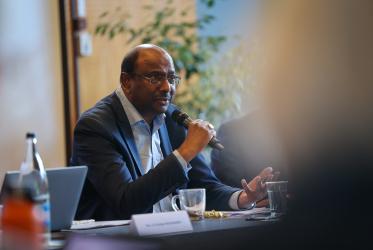Researchers around the world have a new resource for studying the history of the ecumenical movement — the personal papers of Philip Potter, general secretary of the World Council of Churches (WCC) from 1972 to 1984.
The papers are now available via written request or by visiting the reading room of the WCC Archives in Geneva.
“We hope that the WCC Archives will receive many researchers from around the world who will learn more about the ecumenical movement to which Philip significantly contributed throughout his life,” said Hans von Rütte, WCC archivist.
The Potter archiving project began in early 2015 when Bärbel Wartenberg, Potter’s wife, approached the archivists of the WCC about constituting an archival fonds with her husband’s personal papers. Following a formal agreement between Wartenberg and the WCC, the material was transferred as a donation to WCC in spring 2015.
The papers consist of personal papers documenting Potter’s years as a university student; his work as a pastor since the late 1940s in Dominica, Haïti, and Jamaica; his duties at the Student Christian Movement in London; his service with the World Student Christian Federation in Geneva; his leadership at the WCC; his work as a teacher at the University of Kingston in Jamaica; and finally his activities after retirement in Germany.
Born in Roseau, Dominica, in the West Indies on 19 August 1921, Potter began his ecumenical involvement as part of the student Christian movement in the Caribbean. He was a youth representative at the first two WCC assemblies in Amsterdam in 1948, and Evanston, USA in 1954. Among the most memorable achievements during Potter’s tenure as WCC general secretary were the theological consensus document on Baptism, Eucharist and Ministry and the continuation of a campaign against apartheid in southern Africa and against other forms of racism throughout the world.
Potter also made significant contributions to the vigorous debate on the nature of post-colonial Christian mission and evangelism, the churches’ witness for peace amid East-West tensions, the raising of questions concerning the ecological crisis and encouragement of campaigns challenging the threat of nuclear annihilation. Potter died on 31 March 2015 at the age of 93.
Among the archived documents are Bible studies, speeches, preaching and teaching material, notes from meetings and conferences, reading notes, travel reports, notebooks and diaries with personal notes on theology and ecumenism as well as a large body of correspondence.
More material will be added in the coming months, said von Rütte. “Some weeks ago, Mrs Wartenberg announced more of Philip's material,” he said. “We will soon bring that material from Lübeck to Geneva in order to complete the archival fonds to the maximum.”
WCC provides archival resources on the history of ecumenism from its beginnings in the early 20th century to today. The archives are open without restriction to researchers, scholars of the Ecumenical Institute in Bossey, and staff members of the Ecumenical Centre. Research requests may be sent to [email protected].







